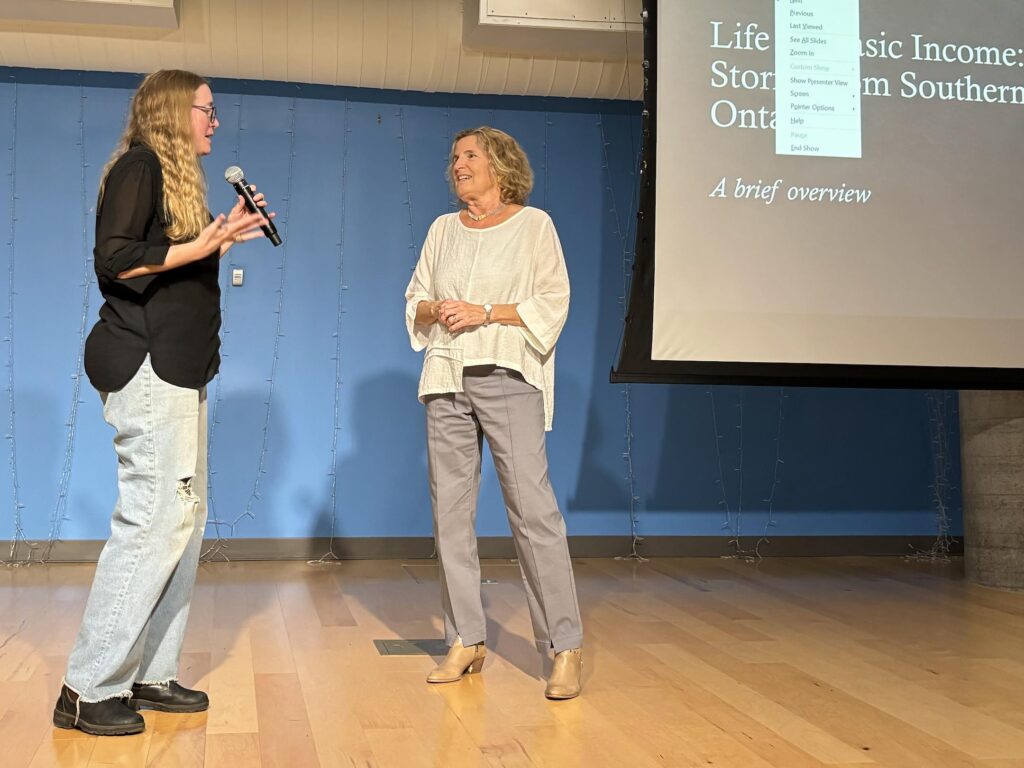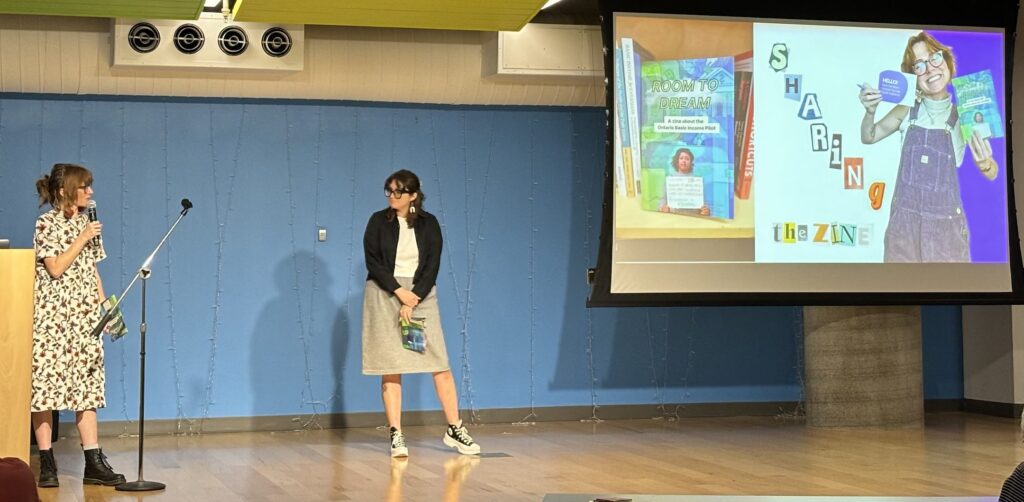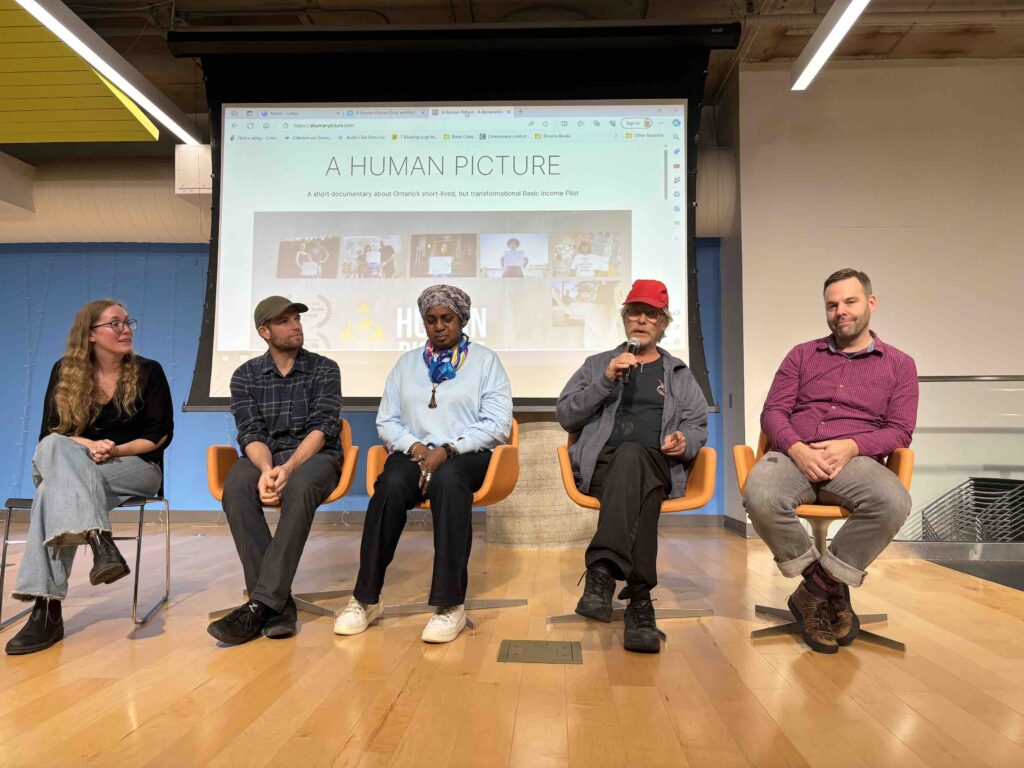Why basic income still matters

Researchers, authors and filmmakers reflect on a social program that puts human thriving at the centre of policy-making.
By film and by photo, zine and op-ed, book authors, researchers, and oral presenters impressed upon 100 people gathered in downtown Hamilton why basic income still matters.
The Hamilton Roundtable for Poverty Reduction hosted the Oct. 27 event with support from the Social Planning and Research Council of Hamilton and the Anglican Diocese of Niagara.
Although Ontario’s Basic Income Pilot Project was prematurely cut five years ago by current Premier Doug Ford’s government, the premier who decided to put basic income in the budget back in 2018, told the crowd, including many former participants, how the pilot continues to have a lasting impact beyond this province.
Kathleen Wynne, who served as Ontario’s premier from 2013 to 2018, kicked off the morning with an energizing hour spent looking ahead more than walking down memory lane to the days when basic income and the Liberals were still in place. Wynne had just spoken days ago to a Senate committee looking at Bill S-233 introduced by Senator Kim Pate, calling for a guaranteed annual income in Canada. A parallel bill has been introduced in the House of Commons by NDP MP Leah Gazan to double the impact.

Wynne shines at audience engagement, managing her own Q&A session, including some questions that challenged why only incremental increases to social assistance rates were introduced under her government. Her answer gave a glimpse into the dynamics of cabinet ministers who represent different parts of the province and bring different priorities to the conversations.
New research focusing on the raw and unfiltered narratives from basic income participants was presented by Beth Wilson and Tom McDowell, two members of a collaboration between McMaster University, Carleton University, and Toronto Metropolitan University. Life on Basic Income: Stories from Southern Ontario, illustrates not just statistics or theoretical models, but real lives touched by the pilot.
The first of many experiences of visual arts communicating the message of BI throughout the day was in the form of a zine from the Basic Income Youth Network. Chloe Halpenny and Kendall David walked through their creative process that led to Room to Dream, and the distribution of over 800 copies to date.
The full-colour zine is a 32-page mixture of research and art, offering a compelling account of the Ontario BI pilot and its effects on participants' lives. It features some photos by Jessie Golem, a former participant in the pilot from Hamilton, who turned her rage at the cancellation into a photo project Humans of Basic Income.

Her photos of BI participants from each of the Ontario pilot sites, accompanied by statements of impact from each, also made their way into a film by local producer Luke Mistruzzi who collaborated once again with Simon Brothers of Stratford, to come up with A Human Picture, a 15-minute look at basic income from the ground level perspective of participants in a pilot program.
A post-film panel included the producers as well as former BI participants who appeared in the film, Tim Button, Rhonda Castello and Golem. Their deep sharing of how the pilot improved their lives in the area of mental health and employment really moved the audience.
Elaine Power and Jamie Swift, co-authors of The Case for Basic Income – Freedom, Security, Justice, discussed the politics of basic income. The book was originally launched two years ago in Hamilton but, amid the pandemic, was a virtual event.

Power, a professor at Queen’s whose research is connected to poverty, class, food, and health, lauds BI but also knows it’s not a silver bullet.
“Basic income won’t fulfill its potential on its own. We need a re-invigorated social safety system that puts human thriving at its centre. That will ensure everyone has what they need to live a life with dignity and to be fully included in society.”
Swift says the day spent in Hamilton renewed his enthusiasm for basic income and left him with the same “cautious optimism” that Golem shares for what is possible.
Deirdre Pike is correctly identified as a “reluctant convert,” to basic income in A Case for Basic Income: Freedom, Security, Justice, by Eileen Power and Jamie Swift. Eventually, she came on full steam ahead, even running for the Ontario Liberals in 2018, because of the hope provided by basic income. @deirdrepike or deirdrepike@gmail.com.













